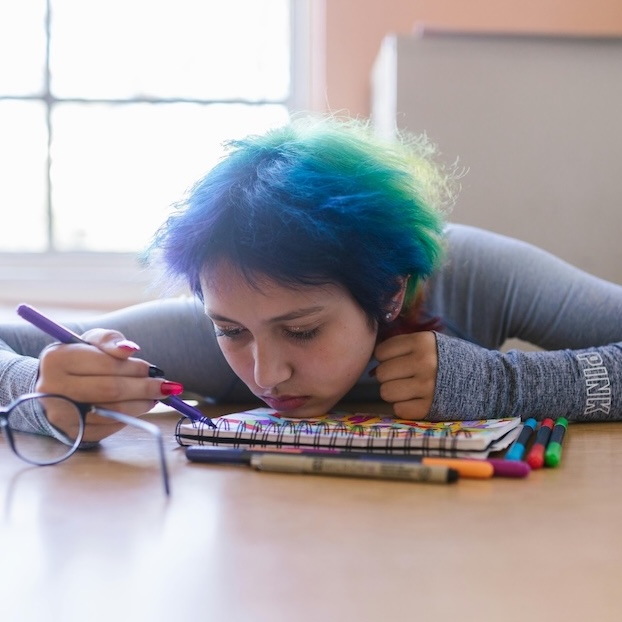Fourth grade: it’s a pivotal year for kids. As their cognitive and hormonal development accelerate, they begin to think more deeply about themselves and others, form complex friendships, and grapple with new emotions. Self-awareness sharpens, peer approval starts to matter more, and questions like “Why can’t I do that?” become more common at home.
But during this time, many still lack the language or tools to express what they’re going through. That’s why this stage can be an ideal time to introduce therapy—as a proactive way to build coping tools and strengthen communication skills before puberty and the emotional highs and lows of middle school kick in.
Of course, every child develops at their own pace. Your student may have already hit this stage, or it may feel miles away. That’s okay. There’s no perfect timeline for emotional growth, and no one-size-fits-all moment for support. What matters most is meeting kids where they are.
Fourth grade might just be the therapy sweet spot.
What Makes Fourth Grade So Unique?
While fourth graders begin trying to find their place socially and start comparing themselves to their peers, they’re still learning how to manage frustration and express their feelings. They’re beginning to:
- Understand abstract concepts like empathy, fairness, and justice
- Link effort to outcomes, which can boost motivation, but also anxiety
- Care more about peer approval, making social dynamics more sensitive
- Critique themselves and others as they grow more self-aware
- Grasp the permanence of loss and change, including death
This blend of cognitive maturity and emotional vulnerability makes fourth grade a critical point for intervention. For many students, therapy can make a lasting difference.
4th Grade Teacher, Sarah, put it this way:
“I’ve seen kids in eight [Hazel] sessions really figure out those talking points and those strategies to re-set and pivot. It doesn’t have to be long-term. If a kid needed glasses, you wouldn’t say you can’t have glasses. At this time in their life, before hormones set in, it’s really valuable to have the language and coping skills in place.”
- Sarah Daunis, 4th Grade Teacher, Santa Monica – Malibu Unified School District
Navigating A New Social Landscape
Fourth grade is often when kids start to ask harder questions—not just about the world, but about their place in it. They begin navigating more nuanced social circles, paying closer attention to who is included, who is left out, and where they stand in the dynamic. This is the year when comparison ramps up: “Why wasn’t I invited?” “Why can she do that and I can’t?”
Friendships become more layered and cliques start to form. Kids begin testing out new versions of themselves to fit in. These changes can lead to feelings of exclusion, self-doubt, and anxiety, especially when children don’t yet have the tools to process or talk about these experiences. Without support, the pressure to belong can begin to take a toll on mental health, reinforcing the need for early, accessible intervention.
Building Coping Skills for Lasting Impact
A fourth grader’s emotional literacy is still developing—they are learning how to handle frustration, process disappointment, and speak up for what they need. They feel big feelings, but can’t always name or manage them.
Therapy helps equip children with tools to understand themselves, navigate relationships, and build confidence. It gives them the language to name what they’re feeling and the strategies to manage those feelings.
When students learn these skills in fourth grade, they’re more likely to carry them into middle school, high school, and beyond.
What therapy with a fourth grader might look like:
- Play-based: Games, art, or storytelling to help kids express feelings
- Naming emotions: learning to recognize and talk about what they feel
- Coping skills: practicing deep breathing, mindfulness, or journaling
- Peer challenges: role-playing social situations to build confidence
- Empathy and perspective: exploring how friends, peers, and family members might feel or react
- Confidence building: focusing on strengths and small wins.
"A 4th grade student was referred to Hazel therapy to build confidence, navigate peer relationships, and work on emotional regulation. As we wrapped up [therapy], they shared feeling sad that therapy was ending, but proud to have reached their goal of learning coping skills. Baking became a favorite strategy; they told me it helps them stay calm and focused, and even memorized an entire cookie recipe, which they recited during our final session! Their parent also noticed a big improvement in how they express and manage their emotions. I’m so proud of all they’ve accomplished!" - Zoe, Hazel therapist, serving Missouri school districts
Hazel offers a supportive space for students who may be showing signs they need help, whether it’s withdrawal, inattention, or changes in energy or behavior. While not every student will need ongoing therapy, all students can be referred. Our intake therapists assess each student’s needs and recommend the right level of support—from short-term skill-building to ongoing care.
So, Is Fourth Grade Really the Therapy Sweet Spot?
Yes. Fourth grade sits at the intersection of awareness and adaptability. It’s when kids begin to think critically, feel deeply, and question who they are in the world. And it’s when they’re still young enough to embrace help, to try new tools, and to build the emotional foundation they’ll need as they grow up.



.jpeg)

